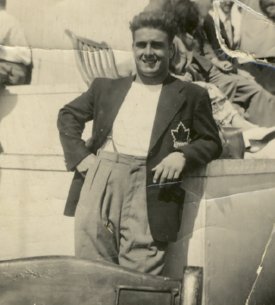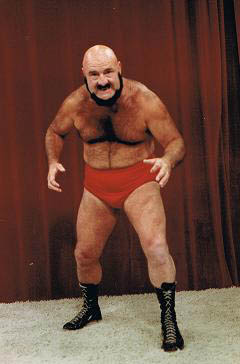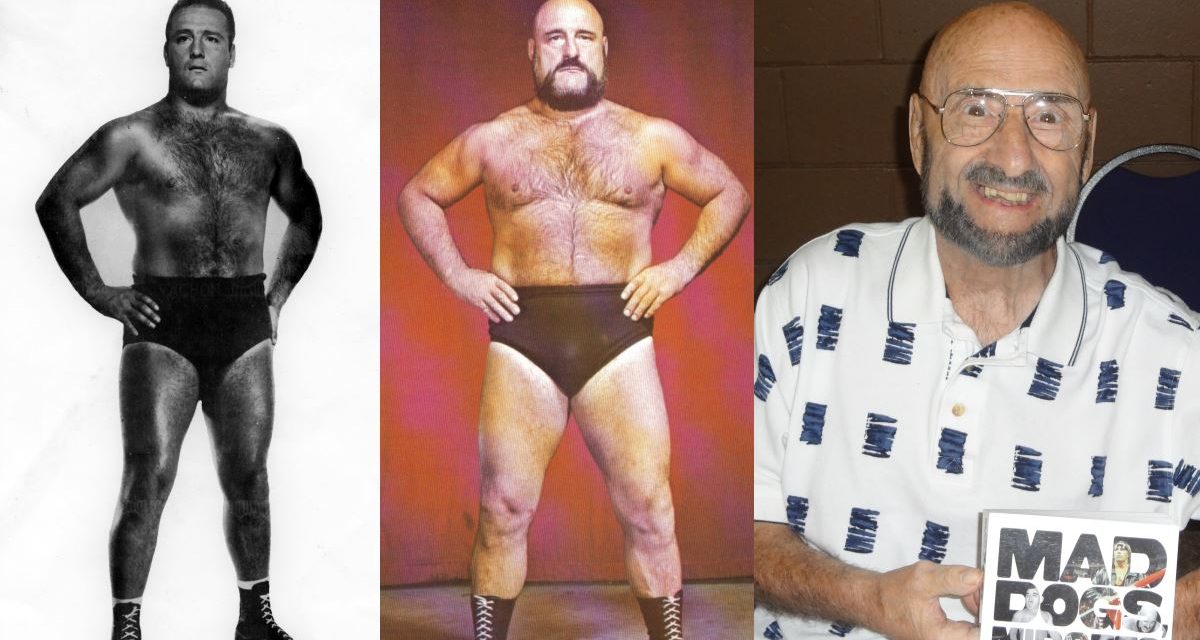When people think of Mad Dog Vachon, they think of a wild, snarling beast, wreaking havoc inside and outside of the wrestling ring.
Too often it is forgotten that Vachon started as a successful amateur wrestler, and competed for Canada at the 1948 Summer Olympics in London, England.
“It’s an incredible feeling. It’s something that’s very hard to explain,” Vachon told SLAM! Wrestling. “It’s something that makes you absolutely and totally very proud.”
He was only 18 when he won the Olympic trials in Toronto, and headed to London for the Games.

Vachon in 1950. (Seriously!)
Vachon recalls his father telling him, ‘If you ever go to the Olympic Games, people will remember it for the rest of your life.’ Though he went on to many, many other significant accomplishments both in and out of pro wrestling, the Mad Dog thinks that his dad was correct.
“He was so right! I started wrestling when I was 12 years old in Montreal at the YMCA. Then when you walk into the Stadium at Wembley in London, there’s probably 6,000 athletes there, King George XI is there, the Queen, and they play your national anthem — it gives you goosepimples.”
Maurice Vachon competed at 174 pounds and finished in seventh place, having been eliminated in the third round. He said that he doesn’t actually remember where he placed, just his matches.
In his first bout, he beat a competitor from India in 22 seconds. In the second, he lost a split decision to a Turk named Adil Candemir (who won silver). The third, he lost by unanimous decision.
 |
He does have an explanation for it all. “What happens is sometimes you burn yourself out on a tough match like that,” he said, referring to his second bout, where he lost a split decision. “After I finished wrestling with the Turk, waiting for the decision, somebody tapped me on the shoulder. It was the coach from Turkey. He said, ‘You won that match.’ And they turned around and gave it to my opponent. It’s part of history.”
Though defeated at the Olympics, Vachon rebounded to win gold at the British Empire Games (the forerunner of the Commonwealth Games) two years later in New Zealand.
The wrestling squad stayed in the Athlete’s Village, which was a converted air force barracks, and they took the London subway to the competition. It was there that he first met a man who would become one of his greatest adversaries in the squared circle. “I met Verne there for the first time.
When asked about meeting the soon-to-be Mad Dog at the London Olympics, Verne Gagne had a laugh. “He had curly hair and he weighed 175 pounds!”
It was a bittersweet trip to the Olympics for Gagne. He made the U.S. Greco-Roman team, but the powers-that-be in American amateur wrestling pulled the squad. “We came right down to the night before we were supposed to wrestle Greco and they pulled us out. They said, ‘We don’t think you guys know enough about Greco-Roman wrestling.’ This is ’48, right after the War, and we really didn’t, but we sure as heck trained hard and wanted to wrestle. We were in the parade and were in the Olympics,” recalled Gagne, who treasures his Olympic memories, even if he didn’t compete.
“It was a great experience. Wembley Stadium was the big parade. It was the first Olympics after World War II and it was a real focal point for the world at that moment in time and most of the world was there. Russia was not there, and a couple of those other countries behind the Iron Curtain didn’t make it.”
Going from a successful amateur career to the pro game made one a target, according to Vachon. “At my size, everybody wanted to try me out. A lot of times, they don’t play fair, they sucker-punch you. After a while you develop [another] instinct, you have eyes in the back of your head. You see it coming. Before they make their move, they’re already done anyways. It helped a lot in the ring. A lot of professional wrestlers, they tried to take advantage of me, and I beat the s*** out of them.”
He confesses to loving watching the Olympics, and is really looking forward to the Games in Sydney. “I love it. It’s amazing. I hold my breath when I see these gymnastics.”

Maurice eventually transformed into Mad Dog.
After thousands of bouts as a pro, bleeding and making mayhem around the globe, Vachon can look back now on his two careers as a wrestler — amateur and pro — and truly see a difference, one that’s not necessarily evident to the outsider.
“When you wrestle professional, the money goes in your pocket,” Vachon said. “When you wrestle amateur, the medals, they go in your heart.”

